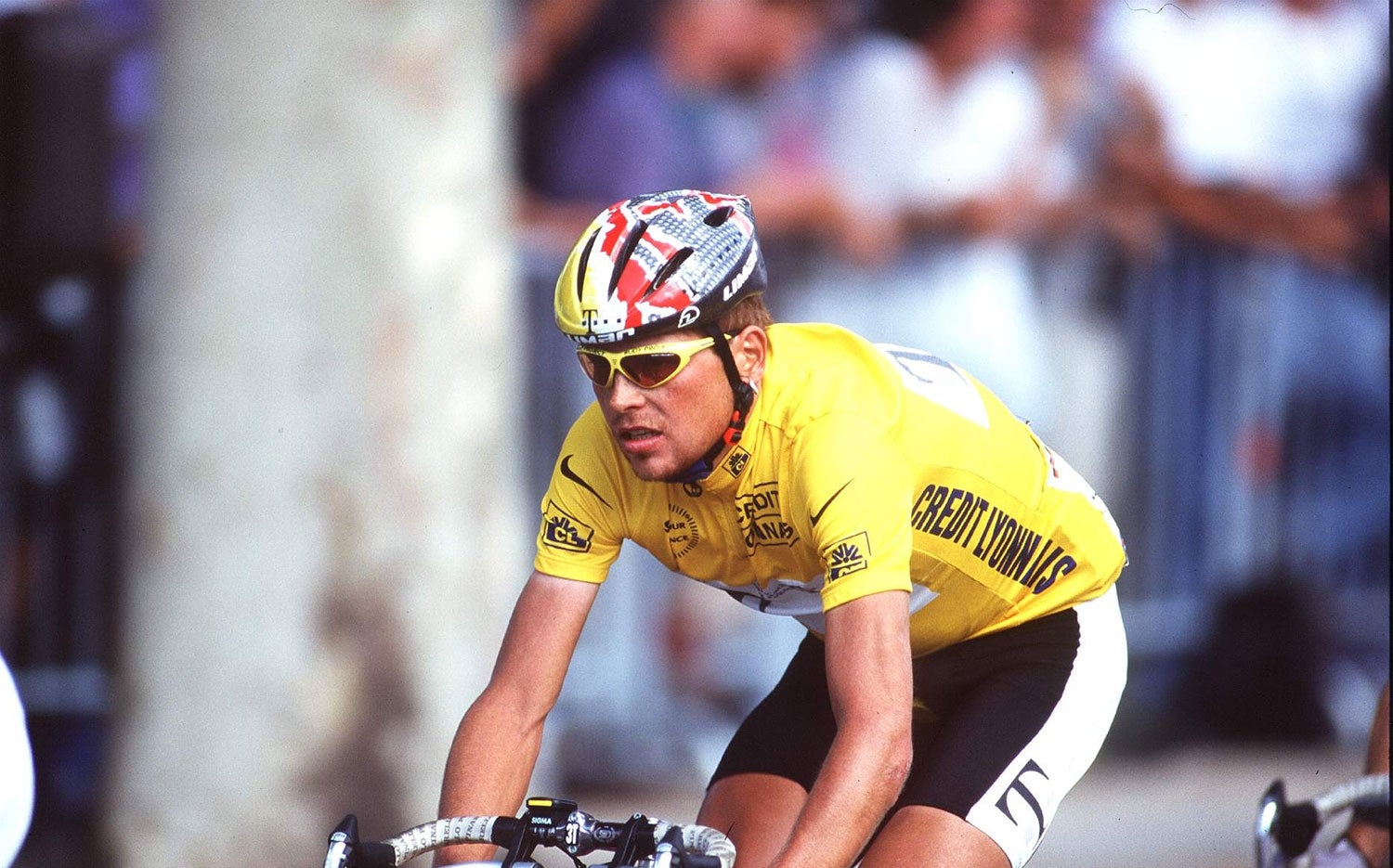Commentary: Jan Ullrich's journey from spotlight to shadow

Jan Ullrich is Germany's only Tour de France champion. Photo: Tim de Waele | Getty Images
Editors’ Note: Author Samuel Abt was a long-time sports journalist and columnist for the New York Times and the International Herald Tribune. He covered the Tour de France and other professional cycling events for more than 30 years. A resident of the Paris area, Abt retired several years ago. Below, he recounts the battles that German champion Jan Ullrich waged against the spotlight.
There he stood on the Champs-Élysées in 1997, the East German wunderkind, the last man to be named to his feeble Deutsche Telekom team for the 1996 Tour de France. He finished second in that one. Now, a year later, he wore the yellow jersey of the Tour champion, an immense prodigy at 23, with the cycling world awaiting his next triumphs.
And there he peaked, at 23. Twenty years later, Jan Ullrich couldn’t even wrangle an official invitation to the start of the Tour in his native country.
What happened to Ullrich in those 20 years? What didn’t?
On the positive side, the list is impressive if short: four second places overall to Armstrong in the Tour after his triumph, victory in the 1999 Vuelta a España, a gold medal in the road race and a silver in the time trial at the 2000 Olympics. Add in the 1993 world amateur road race championship and his second place in the 1996 Tour.
On the negative side, the list is far longer and varied: injuries, illnesses, lax training, weight problems, suspensions for using both performance-enhancing and recreational drugs, too-lenient advisers and the Tour buzzsaw named Lance Armstrong. And, most recently, a life that appears to be in chaos.
Ullrich had only lame defenses to offer for such a waste of talent.
Doping? “Almost everyone at the time was taking performance-enhancing substances. I didn’t take anything that was not taken by the others. It would only have been cheating for me if I had gotten an advantage, which was not the case. I just wanted to ensure I had an equal opportunity”
Illness? “It’s not my fault that I got sick. My only mistake was to get sick.”
Weight? “I like to eat. That’s what the winter is for.”
Mea culpa, at early races each spring I eagerly sought out Ullrich and his consigliere Rudy Pevenage to report on what I knew would be the rider’s excess poundage. A sample from 1998: “Two or three more bratwursts, Herr Ullrich? Seconds on the sauerbraten? Again some schlag on your coffee? The answer in every case appears to have been affirmative.
“Ullrich was heavily in demand last winter on the rubber schnitzel circuit. ‘Heavily’ is indeed the word. By the time Ullrich had downed his last dumpling and begun preparing for the racing season, he weighed about 10 kilograms (22 pounds) more than his usual weight of 73 kilograms. It showed too.”
Thereafter I limited myself to short and snide comments, like the 2000 reference to “the boy blimp” or my supposition that Telekom was still buying his uniforms in the stylish stout department. By then, Ullrich, forever chasing first Marco Pantani and then Armstrong, seemed to deserve some slack.
Slack turned soon enough to indifference. Ullrich no longer deserved headlines.
His conviction in 2002 for drunk driving and firing by Telekom made few ripples in the press. His suspension from the Tour a day before the start in 2006 was noted simply in a list of other banned riders. His 2013 confession to doping in Operacion Puerto in Spain and conviction by the Court of Appeal for Sport in 2012 merited a paragraph or two. The court also voided all his results since May 2005, which was meaningless since he had few of interest. Nobody cared about his refusal to return his Olympic medals.
He retired officially in 2007.
When the Amaury Sport Organisation, the Tour’s owners, refused him credentials for the 2017 start in Dusseldorf, Armstrong’s was the rare and laudable voice of protest. To no avail, he pointed out that the owners had invited such French dopers as Laurent Jalabert and Richard Virenque.
Perhaps Ullrich had bigger concerns: His personal life had become chaotic. He and his longtime companion and their daughter moved from Germany to Switzerland and back again. He broke up with her, got married and moved to Mallorca, Spain.
This summer he was admitted to a psychiatric hospital after a brief detention for allegedly assaulting a prostitute. He was released on bail pending an investigation into possible attempted manslaughter. The case came a week after his 24-hour detention in Spain, where he sought to force his way into the Mallorca home of a neighbor and threatened him.
In September, Armstrong flew to Germany to support Ullrich.
“So great to spend the day with this man,” Armstrong wrote on Instagram. “As many of y’all know, I love Jan Ullrich. He was such a special rival to me. He scared me, he motivated me, and truly brought out the best in me. Pure class on the bike.“ His remarks accompanied a photograph of the two men embracing at a swimming pool.
“Fast forward to today and my friend is going through a rough patch,” Armstrong continued. “I couldn’t pass up the opportunity to come to Germany to spend a few days with him. Please keep Jan in all of your thoughts and prayers. He needs our support right now.”
Attaboy, Lance. Will do.